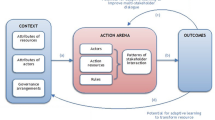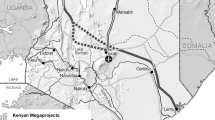Abstract
Powering community development requires a re-invention of traditional authority. This paper interrogates this proposition: how does sage tradition engender social resilience and what is the impact of traditional authority on the modern governance architecture? Sage tradition construed culturally as elder-led authority is anchored on wisdom and respect for elders—a pivotal asset in community development transactions. Informed by indigenous knowledge, social capital and asset-based concepts, an empirical account of strategic leadership by the elderly is proffered, uncovering indigenous governance in the North West Region, Cameroon. A pyramidal power structure validates village elders as key players in advancing social justice. They offer counsel and arbitrate in community affairs and mobilise community members for infrastructure provision—community halls, equipping schools, digging roads, building bridges and supply of fresh water. Though elder esteemed traditions prove perfunctory, findings show communities are benefiting from the accumulated, incremental cultural assets factored into local development. The paper concludes that thriving cultural assets should be amalgamated through a policy drive that taps into the utility of traditional authority, in synergy with modern state institutions to bolster social development, address poverty and social inequality.

Similar content being viewed by others
References
Adem, S. (2004). Cultures of political recycling and conflict resolution in Japan: any lessons for Africa? African and Asian Studies, 3(1), 3–31.
Botes, L., & van Rensburg, D. (2000). Community participation in development: nine plagues and twelve commandments. Community Development Journal, 35(1), 41–58.
Bourdieu, P. (1986). ‘The forms of capital’, handbook of theory and research for the sociology of capital (pp. 241–258). J.G. Richardson. New York: Greenwood Press.
Briggs, J. (2005). The use of indigenous knowledge in development: problems and challenges. Progress in Development Studies, 5(2), 99–114.
Burnell, J. (2013). Small change: understanding cultural action as a resource for unlocking assets and building resilience in communities. Community Development Journal, 48(1), 134–150.
Chambers, R. (1983). Rural development: putting the last first. Harlow: Longman.
Economic Commission for Africa (ECA) (2007) Relevance of African traditional institutions of governance, Addis Ababa, Ethiopia, retrieved at: www.uneca.org/sites/default/files/.../relevance_africantradinstgov.pdf accessed 17/03/2015
Economic Commission for Africa (ECA) (2013) Progress in the promotion of popular participation and governance in Africa, Addis Ababa, Ethiopia, retrieved at: repository.uneca.org, accessed 17/03/2015.
Ellis, F. (2000). Rural livelihoods and diversity in developing countries. Oxford: Oxford University Press.
Escobar, A. (1995). Encountering development: the making and unmaking of the third world. Princeton NJ: Princeton University Press.
Eyong, C.T. (2007) Indigenous knowledge and sustainable development in Africa: case study on Central Africa, In: Indigenous knowledge systems and sustainable development: relevance for Africa, Boon E.K, and Hens, L. (2007) (eds), Tribes and Tribals, Special Volume No. 1:121–139.
Fonchingong, C., & Fonjong, L. (2002) The concept of self-reliance in community development initiatives in the Cameroon Grassfields. GeoJournal, 57 (issues1–2):83–94.
Fonchingong, C. (2005) “the Mechanics of communitarianism and social capital in North-West Cameroon“, International Development Planning Review 2005, 27(4):427–449, Liverpool University Press, UK.
Fonchingong, C., & Ngwa, C. (2005). Grassroots participation for infrastructural provisioning in North-West Cameroon: are village development associations the Panacea. Canadian Journal of Development Studies, 26(3), 443–460.
Fonchingong, C. (2013) Citizen Strategizing amid a Solidarity Economy in Cameroon: Are Village Development Associations (VDAs) Resilient? Draft Paper prepared for UNRISD conference on Potentials and Limits of Social and Solidarity Economy, Geneva, May 2013, available at: www.unrisd.org
Fonchingong, C. (2014). Firming up institutional policy for deprived elderly in Cameroon. Politics and Policy, 42(6), 948–980.
Ghosh, S. (2014). Citizenship in practice: poverty reduction and self-help groups, Journal of Asian and African studies 2014. Vol., 49(4), 442–456.
Geschiere, P. (1993). Chiefs and colonial rule in Cameroon: inventing chieftaincy, French and British Style, Africa. Journal of the International African Institute, 63(2), 151–175.
Goe, W. R., & Noonan, S. (2007). The Sociology of community. In C. D. Bryant & D. L. Peck (Eds.), 21st century sociology: a reference handbook Volume 1 (pp. 455–464). Thousand Oaks, CA: Sage.
Hase, P. (2013). Custom, land and livelihood in rural South China: the traditional land law of Hong Kong’s new territories, 1750–1950. Hongkong: Hongkong University Press.
Help Age International (2009) Older people in community development: the role of Older People’s Associations (OPAs) in Enhancing Local Development, retrieved December 08, 2014 at: www.helpage.org
Herbert, S. (2000). For Ethnography. Progress in Human Geography, 24, 550–568.
International Monetary Fund (IMF) (2013). World economic Outlook 2013. Washington DC: IMF.
Kangalawe, R.Y.M., Noe, C., Tungaraza, F.S.K., Naimani, G., and Mlele, M. (2014) Understanding of traditional knowledge and indigenous institutions on sustainable land management in Kilimanjaro Region, Tanzania. Open Journal of Soil Science, 4, 469–493. doi: 10.4236/ojss.2014.413046, accessed 13/03/2015.
Kisangani, E. (2009). Development of African administration: pre-colonial times and since. Administration and Public Policy, 1, 1–7.
Kleist, N. (2011). Modern chiefs: tradition, development and return among traditional authorities in Ghana. African Affairs, 110(441), 629–647.
Kofele-Kale, N. (2011). Local governance under Cameroon’s decentralisation regime: is it all sound and fury signifying nothing? Commonwealth Law Bulletin, 37(3), 513–530.
Ling, C., & Dale, A. (2014). Agency and social capital: characteristics and dynamics. Community Development Journal, 49(1), 4–20.
Matarasso, F. (2007). Common ground: cultural action as a route to community development. Community Development Journal, 42(4), 449–458.
Mathei, A., & Cunningham, G. (2003). From clients to citizens: asset-based community development as a strategy for community-driven development. Development in Practice, 13(5), 474–486.
McLean, J. (2011) Asset-based approaches for health improvement: redressing the balance. Briefing Article 9 Concept Series, Glasgow Centre for Population Health, UK, retrieved at: http://www.gcph.co.uk/assets/0000/2627/GCPH_Briefing_Article_CS9web.pdf (23 November 2014).
Mengisteab, K. (2003). “African traditional institutions of governance: the case of Eritrea’s village baito”, in Olufemi Vaughan, ed. indigenous political structures and governance in Africa. Ibadan: Sefer, 2003, 208–223.
Mazrui, A. (2001). Ideology and African political culture. In T. Kiros (Ed.), Exploration in African political Thought: identity. Community, Ethics, New York: Routledge.
Mbuagbo, O. T. (2012). Cameroon: flawed decentralization and the politics of identity in the Urban Space, Global Journal of Human Social Science, Sociology. Economics and Political Science, 12(11), 14–25.
Moser, C. (2009). Ordinary families, extraordinary lives: assets and poverty reduction in Guayaquil, 1978–2004. Washington, DC: Brookings Institution Press.
Navarro, Z. (2006). In search of cultural interpretation of power. IDS Bulletin, 37(6), 11–22.
Njoh, A. (2002). Barriers to community participation in development planning: lessons from the Mutengene (Cameroon) self-help water project. Community Development Journal, 37(3), 233–248.
Njoh, A. (2014) The Meta indigenous politico-administrative system, good governance, and the modern republican state in Cameroon, Journal of Asian and African studies, Retrieved at: http://jas.sagepub.com/content/early/2014/04/16/0021909614528772
Parnini S, and Othman, M (2014) Democratic consolidation and credibility of governance institutions in Bangladesh, Journal of Asian and African Studies, 2014 (49) 1: 34–48.
South Africa Yearbook 2010/11- Social Development, available at www.gcis.gov.za, accessed 13/3/2015.
Stott, J. (2011). Understanding community assets, Scottish anti poverty review, Winter 2011/12. UK: The Poverty Alliance.
Taylor, M. (2007). Community participation in the real world: opportunities and Pitfalls in new governance spaces. Urban Studies, 44(2), 302.
Tanga, P., & Fonchingong, C. (2009). NGO-State interaction and the politics of development in Cameroon in the context of liberalisation. International NGO Journal, 4(4), 084–096.
UNESCO (2003). Women and peace in Africa: case studies on traditional conflict resolution practices. Paris: UNESCO.
Von Trotha, T. (1996). From administrative to civil chieftaincy: some problems and prospects of African chieftaincy. Journal of Legal Pluralism, Nos., 37-38(1996), 79–108.
World Bank (1998). Indigenous knowledge for development: a framework for action. Washington DC: World Bank.
World Bank (2001). Understanding and measuring social capital. Washington, DC: World Bank.
World Bank (2013). World development indicators 2013. Washington, DC: World Bank.
Zheng, S. (2008). The last long house: the patrilineal family and cultural transformations of the Jinuo people. Kunming: Yunnan Peoples Press.
Author information
Authors and Affiliations
Corresponding author
Rights and permissions
About this article
Cite this article
Fonchingong, C.C. Optimising Community-Driven Development Through Sage Tradition in Cameroon. Glob Soc Welf 5, 145–153 (2018). https://doi.org/10.1007/s40609-016-0052-6
Published:
Issue Date:
DOI: https://doi.org/10.1007/s40609-016-0052-6




